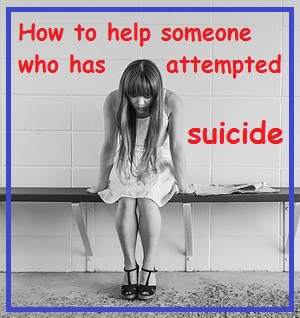
How to help someone who has attempted suicide. Photo via Pixabay by Ryan McGuire
Guest post by Steve Johnson
Suicide is a worldwide problem that affects over a million people each year, and in the U.S. there are varying age groups that suffer. It can be difficult to know where to begin in helping someone who has attempted suicide, in part because there is such a stigma surrounding it; however, if someone you care about has attempted to harm themselves and you fear it might happen again, there are signs you can watch for and things you can do to help.
Suicidal thoughts
One of the first steps in being of help is understanding that a person who has suicidal thoughts is coming from a place so full of pain or self-loathing that they can see no other way out. Beginning a conversation with accusatory words is setting off on the wrong foot; instead, try to keep in mind that their motives might be outside your understanding. It can be difficult or impossible to commiserate with someone when you yourself have never suffered from depression, so it’s important to let them know that you’re there for them and that you will listen and take them seriously. Never make them feel as though they are acting selfishly or introduce guilt.
Learning about suicide
Depression and suicidal thoughts affect people for varying reasons, but those who are most at risk include veterans, victims of abuse or trauma, and people who suffer from mood disorders or substance abuse. For these groups, there is a higher concentration of depression and a risk of addiction to drugs or alcohol, which can trigger suicidal thoughts.
Those who have attempted suicide before are often unfairly labeled as “crazy” or judged as someone who won’t accept help, but this couldn’t be further from the truth. It can be extremely helpful if you create an atmosphere for them that helps them feel safe and offer to help them find healthy ways to cope with their feelings, which might include therapy, art therapy, or attending a group session.
Warning signals of suicide
Often, a person who has attempted to harm or kill themselves is simply in pain, and sometimes they feel isolated or misunderstood. It’s important, therefore, to know the warning signs of suicidal thoughts and to feel comfortable starting a conversation about it.
Some of the warning signals include:
- Talking about feelings of hopelessness
- Vocalizing feelings of being a burden
- Talking about dying or suddenly seeming to be saying goodbye to loved ones
- Sudden violent or manic mood swings
- Changes in sleeping and eating habits
- A sudden disinterest in personal hygiene
- Risky behaviors
If your loved one is exhibiting any of these behaviors, let them know you’re here for them and that they can talk to you. If you feel that self-harm is imminent, remove any items from the area that the individual could use to hurt themselves and don’t leave them alone.
It’s important to remember to practice self-care as well. Stepping up to help someone in this situation can take a toll on your own emotions and mental state. Keep in mind that your loved one may need a trained professional’s help and that you don’t have to take responsibility for every aspect of their lives. You can help them seek assistance from a counselor or therapist, or provide them with a help line if they feel they need to talk anonymously.
Steve Johnson has always been dedicated to promoting health and wellness in all aspects of life. Studying in the medical field has shown him how important it is for reputable health-related facts, figures, tips, and other guidance to be readily available to the public. He created PublicHealthLibrary.org with a fellow student to act as a resource for people’s overall health inquiries and as an accurate and extensive source of health information. When he isn’t hard at work in his studies, Steve enjoys playing tennis and listening to his vintage record collection.